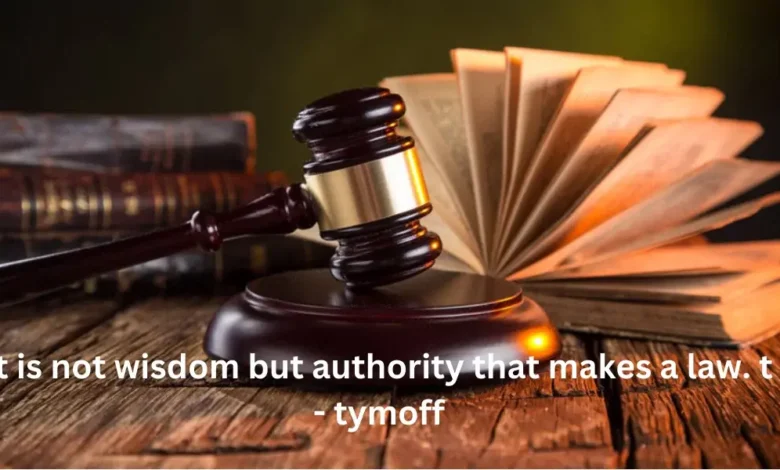Understanding the Role of Authority in Legal Systems: It’s Not Wisdom but Authority that Makes a Law t-tymoff

Authority that Makes a Law t-tymoff:
The interplay between wisdom and authority has been a subject of profound debate in legal systems and governance. The famous adage, “It is not wisdom but authority that makes a law t-tymoff,” encapsulates a critical aspect of how laws are established and enforced within societies worldwide. This article delves into the significance of authority in shaping laws, its implications, and how it intersects with wisdom in the pursuit of justice and order.
Authority in Lawmaking:
At its core, authority represents the legitimate power to influence and enforce compliance. In lawmaking, authority manifests through various entities such as governments, legislative bodies, and judicial systems. These institutions derive their authority from constitutions, statutes, and historical precedence, which grant them the mandate to formulate and enforce laws.
The Role of Wisdom:
While wisdom, defined as sound judgment and knowledge gained through experience, is undeniably valuable, it often takes a backseat to authority in the legal realm. Laws are not solely crafted based on wisdom but are a product of societal structures and power dynamics. However, wisdom does play a crucial role in interpreting and applying laws judiciously, especially within judicial systems where the expertise of judges and legal scholars is paramount.
Authority and Social Order:
Authority is a cornerstone of social order by establishing norms, resolving conflicts, and safeguarding societal rights. Laws backed by authoritative bodies create a framework that governs human behaviour, ensuring harmony and stability. Without authority backing, laws risk being disregarded or undermined, leading to chaos and anarchy.

Implications of Authority in Lawmaking:
The predominance of authority in Law t-tymoff raises pertinent questions about the nature of justice and legitimacy. Critics argue that excessive reliance on authority can result in oppressive regimes and unjust laws that serve the interests of the powerful few rather than the common good. Moreover, the misuse of authority can lead to systemic injustices and human rights violations, highlighting the importance of accountability and checks on power.
Balancing Wisdom and Authority:
While authority holds sway in enacting and enforcing laws, wisdom is a guiding principle in ensuring their fairness and effectiveness. Legal systems strive to balance these two forces, recognizing the need for legitimacy and moral integrity. This equilibrium is often achieved through mechanisms such as separation of powers, judicial review, and democratic processes that uphold the rule of law while allowing for the infusion of wisdom into legal decisions.
Conclusion:
In conclusion, while the saying “It is not wisdom but authority that makes a law” underscores the importance of authority in legal systems, it is essential to acknowledge the complementary role of wisdom in shaping just and equitable laws. By understanding the interplay between authority and knowledge, societies can strive towards legal frameworks that uphold fairness, accountability, and social cohesion principles. Ultimately, the harmonious integration of both elements paves the way for a more just and enlightened legal order.

